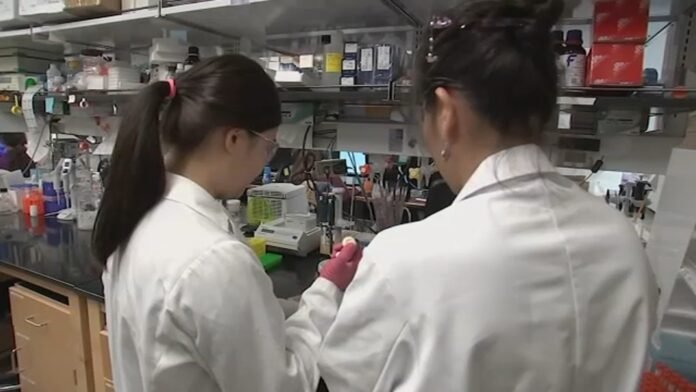CHAPEL HILL, NC (WTVD) — No matter which generation you bring to the UNC campus, the spirit of academia remains true. However, teachers’ and students’ approaches to age-old questions have changed dramatically as the evolution of artificial intelligence plays a major role in everyday functions.
“The first thing that stands out about AI is how excited and enthusiastic everyone is,” said Dr. Michael Barker, vice chancellor for information technology and chief information officer at UNC.
“I’m really encouraged by the number of different types of projects that people have had ideas about and the energy that seems to be building around this,” added Dr. Andy Lang, the UNC Associate Dean of IT and Data Analytics, added.
There is a saying in the AI world that you are not replaced by AI, you are replaced by someone who knows AI.
– Mark McNeilly, UNC professor
Chancellor Lee Roberts, discussing AI at his installation ceremony earlier this month, noted its role in a “rapidly developing world.”
An August report from the Digital Educational Council found that 86% of students surveyed regularly used AI in their studies.
“Students are definitely taking advantage of it,” says Mark McNeilly, professor of marketing practice.
McNeilly integrates artificial intelligence into his classes and even teaches an AI entrepreneurship course.
“There’s a saying in the AI world that you’re not going to be replaced by AI, you’re going to be replaced by someone who knows AI. That’s why it’s critical that students have AI skills and that teachers have the skills to pass on to students,” McNeilly said.
A job vacancy analysis by PricewaterhouseCoopers shows three times higher hiring growth for roles that require specialized AI skills, and a potential average wage premium of 25% for those roles.
The fact that it has been so active, so fast, and occupied the minds of so many people is truly remarkable. But it’s still early.
-Dr. Michael Barker, UNC Vice Chancellor for Information Technology and Chief Information Office
“We really need to ensure that our students have the skills they need to compete in the marketplace. We know from data that hiring people are looking for students with AI skills, and so we need to make sure we have those skills to give them those skills,” McNeilly said.
UNC has established a Generative AI Committee and an AI Acceleration Program, giving officials a range of tasks and responsibilities when it comes to AI integration.
“The fact that it has been so active, so fast and occupied the minds of so many people is truly remarkable. But it is still in its infancy. Part of what the programs do is cast a wide net so that we can actually get the expertise and advice. from a broader group of people thinking about it and wondering what the right applications are, where you can get the small wins, where you can get bigger opportunities,” Barker said.
The goals of the AI Committee include providing recommendations to the Provost for funding and increasing their use of grants and projects for faculty, staff, students, and campus units. The AI Acceleration Program focuses on providing incentives, including grants and matching funds, to encourage its adoption as part of education, research and other uses.
“I think one of the drivers had to do with democratizing access to AI,” Lang said.
Possibilities include things like writing code and streamlining research, with AI seen as an important tool to advance medical progress.
“Historically, in the field of drug discovery, where we may have used traditional methods to test hundreds, if not thousands, of compounds in a laboratory, it would have taken years to identify drugs that could be used to treat new diseases or treat conditions. With AI we can now limit the number of targets that have to go to the laboratory. Instead of testing hundreds or thousands in the lab, we can test dozens. And that speeds up the process of identifying new medicines and treating diseases,” Johns explains.
Lang further noted its application in the humanities.
“One project I’ve been talking to someone about has to do with the corpus of documents that St. Thomas Aquinas has produced, and to have AI look at that body of work and maybe bring up things that haven’t surfaced before. are also interfaces with philosophy and so on,” Lang said.
Amid all this, and part of the committee’s focus, is establishing guidelines on when it is appropriate to use artificial intelligence, which despite its rapid development still has limitations.
“Part of the role of academia is to not just use a tool to do research or whatever the field is, but to do research into AI itself. To ensure we can understand the models, we can understand how the models have performed, understand the shortcomings of the AI models, and then work on innovation to strengthen or address them so that we can get to the point where we can rely on it,” says Johns.
Even when it comes to tasks it can complete, the ethical debate over its usefulness continues both on and off campus.
“If I write a letter to my daughter, if I write a letter about condolences or something like that, it matters that I write it, rather than the machine writing it. So it puts us in a situation where we have to thinking about what it is to interact and be human,” Barker explains.
Copyright © 2024 WTVD-TV. All rights reserved.





